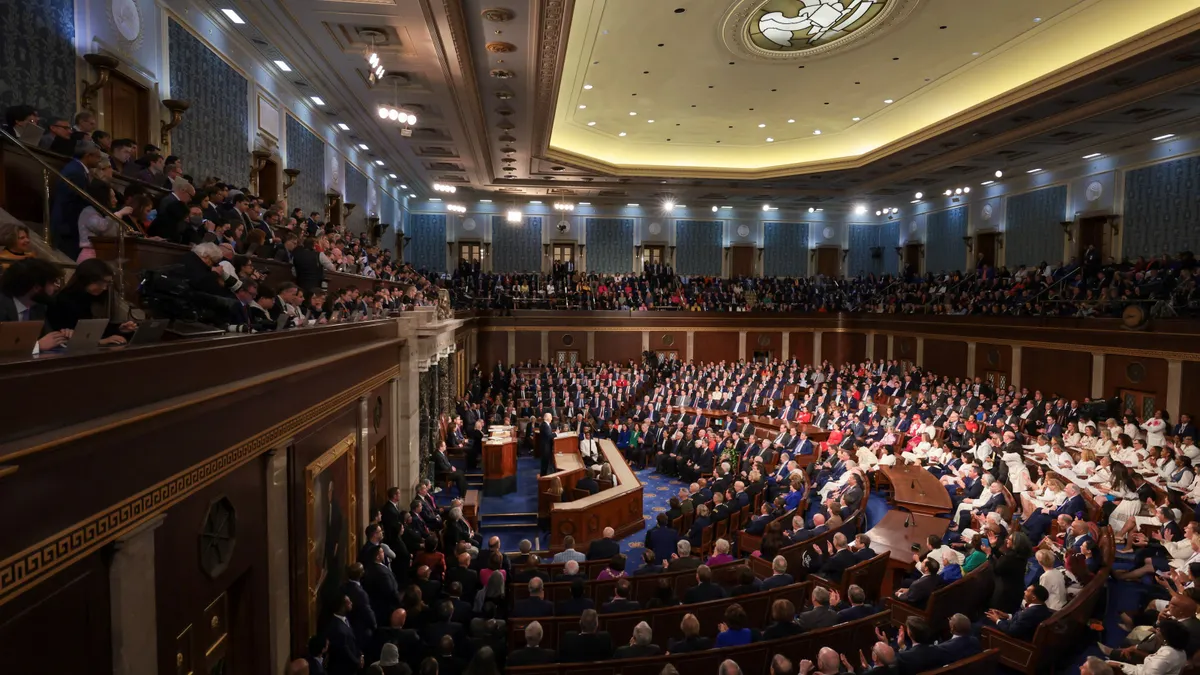Dive Brief:
- The House of Representatives approved a resolution Wednesday abolishing a Consumer Financial Protection Bureau rule giving the agency regulatory authority over large tech companies that offer consumer payment tools. The Senate approved the measure earlier, on March 5.
- Last month, President Donald Trump indicated that he would sign the resolution, which rescinds the bureau’s oversight of companies that process more than 50 million consumer transactions annually. The CFPB rule enabling more oversight also called for stiff new penalties in cases of non-compliance.
- Interest groups representing large retailers and tech companies, including Amazon, Google and Expedia, filed suit earlier this year to block the rule. The CFPB told a federal court on March 21 that it would not enforce the rule, temporarily, as the bureau’s new leaders review policies from the Biden administration.
Dive Insight:
The rule, “Defining Larger Participants of a Market for General-Use Digital Consumer Payment Applications,” gave the CFPB authority to supervise and examine nonbank technology companies that offer peer-to-peer money transfer and digital wallet services, such as Block’s Cash App, Google Pay, Apple Pay and PayPal’s Venmo.
Such tools have become commonplace, the agency said, necessitating the rule. The agency said the new interpretive rule would help to prevent fraud, protect consumers’ privacy and thwart illegal account closures.
“Today’s vote is a win for consumers, small businesses and the future of financial innovation,” Penny Lee, president and CEO of the Financial Technology Association, said Wednesday in an emailed statement, calling the CFPB rule “overreaching and duplicative as payment companies are already regulated at the state and federal levels.”
In January, the rule prompted a swift lawsuit by two industry groups, TechNet and NetChoice, which mounted a coordinated attack through Congress and litigation.
“We applaud Congress for sticking up for American innovators over power-hungry Biden bureaucrats,” Chris Marchese, director of the NetChoice’s litigation center, said in an email. “This underscores why agencies must not exceed their lawful authority and follow the law as Congress wrote it.”
Republicans Sen. Pete Ricketts and Rep. Mike Flood, both of Nebraska, introduced the Congressional Review Act resolution in February, seeking to abolish the CFPB rule.
The legislative review action could make the litigation moot, representatives for TechNet and NetChoice said in interviews last month.
The Biden administration’s effort to exert oversight in the area sparked a fierce industry reaction. The companies viewed the bureau as appropriating sweeping new enforcement authority that allowed regulators to scrutinize not just consumer payments but potentially all aspects of their businesses.
When the rule was enacted, the agency noted that banks and credit unions that offer similar payments services are already subject to such supervisory authority and examinations by the CFPB.
The House action “cements a regulatory blind spot for payment apps and leaves people with little recourse to resolve a dispute beyond asking for help from their chatbot,” Adam Rust, director of financial services for the Consumer Federation of America, said Wednesday in a statement. “Supervision is an essential tool for regulators to preserve our privacy and hold Big Tech accountable for fraud.”
The federation likened non-bank payment apps to the “the Wild West, where well-intentioned, non-bank companies compete against Big Tech bad actors that have certainty that no one is watching when they move fast and break things.”
The House vote was 219-211 with all Democrats opposed. The resolution passed the Senate 51-47 with all Democrats and Missouri Republican Sen. Josh Hawley opposed.
Under the 1996 CRA legislation, if the House and Senate both pass a resolution and the president signs it, an agency rule is rescinded immediately, according to the Library of Congress. The resolution’s passage prevents a future CFPB from enacting a rule that is “substantially similar” to the one Congress revoked.











